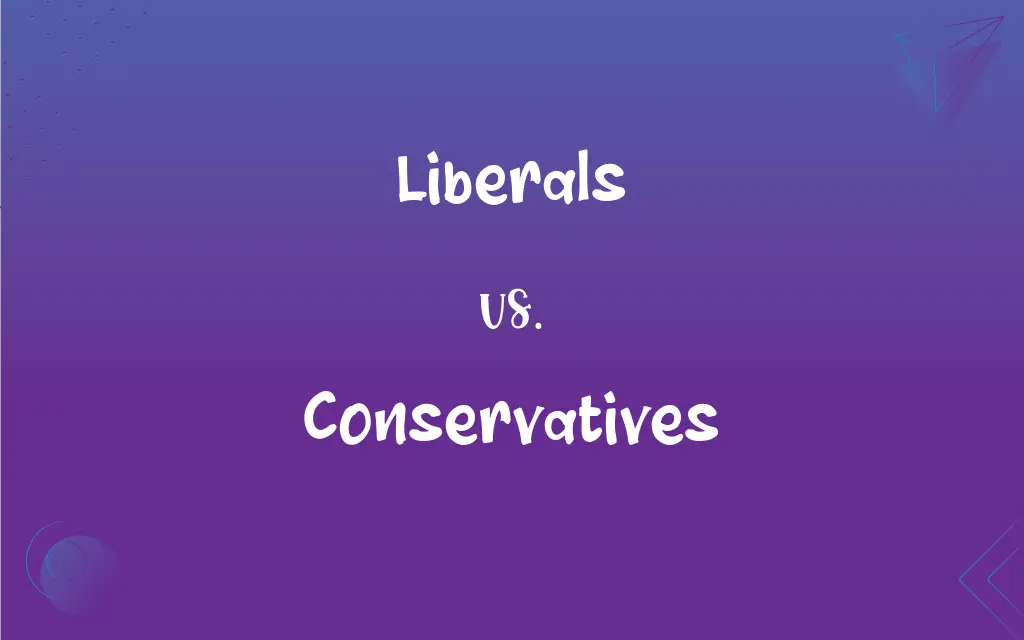Liberals vs. Conservatives: What's the Difference?
Edited by Janet White || By Harlon Moss || Updated on October 11, 2023
Liberals generally advocate for social equality and progressive reform, whereas conservatives tend to uphold traditional values and resist abrupt change.

Key Differences
Liberals, by definition, tend to emphasize the role of government in addressing social inequalities and advocating for change that promotes social justice. This could entail policies that enhance social services, prioritize environmental conservation, or protect minority rights. In contrast, conservatives might assert the importance of limited government, believing that a lesser governmental role could foster personal responsibility and freedom, maintaining a framework that has been historically recognized and accepted.
In economic facets, liberals often support progressive taxation and tend to endorse programs that involve a redistribution of wealth, intending to bridge the socio-economic gaps that can occur in free-market systems. Conversely, conservatives generally emphasize a free-market system, where government interference is minimized, believing that such an approach stimulates economic growth and ultimately benefits society through the trickle-down effect, despite potential economic disparities.
Regarding social issues, liberals are typically more progressive, endorsing equal rights and often supporting policies that cater to various social, ethnic, and cultural backgrounds and orientations. On the opposite end, conservatives might uphold traditional social values, resisting policies that they perceive as conflicting with these established norms and beliefs, emphasizing the preservation of established traditions and social structures.
When it comes to governance and regulation, liberals might advocate for laws that regulate industries and personal behaviors in a manner that prioritizes communal well-being, such as gun control or environmental regulations. In contrast, conservatives may prioritize individual freedoms, arguing that limited regulation allows for personal autonomy and economic innovation, often adhering to the principle that individual rights should not be compromised by communal needs.
In the realm of international relations, liberals might stress international cooperation, advocating for a collaborative approach to global issues through multinational organizations and agreements. In contrast, conservatives often emphasize national interests, advocating for policies that prioritize the nation’s citizens and security even if it means adopting a more unilateral approach in global affairs.
ADVERTISEMENT
Comparison Chart
Government Role
Advocate for a proactive governmental role in social issues
Prefer limited government interference in personal lives
Economic Approach
Support wealth redistribution through progressive taxation
Emphasize a free-market approach
Social Issues
Tend to be progressive and inclusive
Typically uphold traditional social values
Regulation
May support regulations prioritizing communal well-being
Often prioritize individual freedoms and autonomy
International Relations
Stress international cooperation
Emphasize national interests and may adopt a unilateral approach
ADVERTISEMENT
Liberals and Conservatives Definitions
Liberals
Supporters of governmental involvement in societal issues.
Liberals usually believe that government can rectify social inequalities.
Conservatives
Preservers of established practices and institutions.
Conservatives tend to resist reforms that shake existing systems.
Liberals
Advocates of social reform and equality.
Liberals often push for policies that promote social justice.
Conservatives
Advocates for preserving traditional social and moral values.
Conservatives often oppose rapid changes in societal norms.
Liberals
Proponents of progressive values and inclusiveness.
Liberals tend to support LGBTQ+ rights unequivocally.
Conservatives
Supporters of limited governmental interference in individual lives.
Conservatives typically favor policies that restrict government intrusion.
Liberals
Favoring cooperative approaches in international relations.
Liberals typically advocate for resolving conflicts through diplomatic means.
Conservatives
Proponents of a free-market economic system.
Conservatives believe that a free-market system fosters economic growth.
Liberals
Endorsers of a regulatory approach for collective wellbeing.
Liberals might back strict regulations to curb environmental degradation.
Conservatives
Upholders of national interests in international dealings.
Conservatives prioritize the country's needs and security in global matters.
Liberals
Favoring reform, open to new ideas, and tolerant of the ideas and behavior of others; not bound by traditional thinking; broad-minded.
Conservatives
Favoring traditional views and values; tending to oppose change.
Liberals
Of, relating to, or characteristic of liberalism.
Conservatives
Traditional or restrained in style
A conservative dark suit.
FAQs
How do liberals typically view economic inequality?
Liberals often support measures, like progressive taxation, to reduce economic disparities.
What are core values of liberals?
Liberals often value social equality, progressive reform, and governmental involvement in addressing societal issues.
How might liberals approach international relations?
Liberals usually advocate for multinational cooperation and dialogue in international relations.
What kind of governmental interference might liberals support?
Liberals might support interference aimed at reducing socio-economic disparities and enhancing communal welfare.
What is a key principle for conservatives?
Conservatives typically emphasize preserving traditional values and limiting governmental intervention.
What is the conservative stance on economic regulation?
Conservatives generally favor minimal economic regulation to uphold a free-market system.
Do liberals support governmental regulation?
Generally, liberals may support government regulations that they believe enhance societal well-being.
Are liberals likely to prioritize individual or collective well-being?
Liberals might prioritize collective well-being, even if it means imposing regulations.
Can conservatives have liberal social views?
Yes, some conservatives might hold liberal views on certain social issues.
How do conservatives weigh individual vs. collective needs?
Conservatives generally prioritize individual freedoms, even if it means limiting collective regulations.
How do conservatives commonly deal with international affairs?
Conservatives often prioritize national interests, sometimes adopting a unilateral approach.
How do conservatives perceive societal norms?
Conservatives typically advocate for maintaining established societal norms and values.
How do liberals perceive social reform?
Liberals typically view social reform as a necessary means to achieve equality and justice.
How might conservatives view social stability?
Conservatives often value social stability and may resist abrupt changes to preserve it.
Can liberals be financially conservative?
Yes, being liberal on social issues doesn’t preclude fiscal conservatism.
What might be a liberal standpoint on social issues?
Liberals usually support progressive, inclusive stances on social issues.
Are conservatives likely to support strict governmental regulation?
Conservatives often oppose strict regulation, valuing individual autonomy and free enterprise.
What could be a liberal standpoint on environmental issues?
Liberals typically prioritize environmental conservation, sometimes advocating for robust regulation.
How might conservatives approach environmental regulations?
Conservatives might prioritize economic interests, sometimes resisting stringent environmental regulations.
How do conservatives generally view governmental power?
Conservatives typically argue for restricting governmental power, ensuring more personal and economic freedom.
About Author
Written by
Harlon MossHarlon is a seasoned quality moderator and accomplished content writer for Difference Wiki. An alumnus of the prestigious University of California, he earned his degree in Computer Science. Leveraging his academic background, Harlon brings a meticulous and informed perspective to his work, ensuring content accuracy and excellence.
Edited by
Janet WhiteJanet White has been an esteemed writer and blogger for Difference Wiki. Holding a Master's degree in Science and Medical Journalism from the prestigious Boston University, she has consistently demonstrated her expertise and passion for her field. When she's not immersed in her work, Janet relishes her time exercising, delving into a good book, and cherishing moments with friends and family.































































